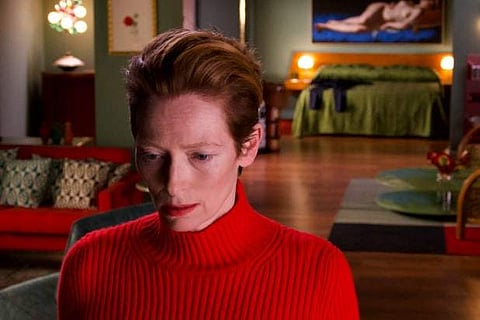

Inventions arise from need, and the pandemic-inflicted restrictions have caused filmmakers to think up new and enterprising ways of filmmaking. Stories are being set in more contained spaces, dispensable gadgets have suddenly become mandatory tools, and crew members are having to help out across departments. Perhaps it’s this culture of transformation that has resulted in changes in the cinematic form as well—and such experiments, never mind their efficacy, must always be encouraged and make for fascinating viewing. Film festivals, of course, are pantheons of such experiments and this year’s IFFI has seen its share already.
The most entertaining among them so far has been accomplished filmmaker Pedro Almodovar’s The Human Voice, featuring the arresting Tilda Swinton. The film is barely half-hour long, and if that seems like an experiment enough, here’s more: This adaptation of a play by Jean Cocteau, features only the protagonist (Swinton)—and well, her sweet-tempered dog—and establishes early on that her home is, in fact, a theatre set, as the camera glides aerially over the ceiling-less rooms that she inhabits. And yet, every time the camera closes in on Tilda and her home, there’s no sense of a performance, only that of a real person struggling to deal with separation. The only conversation she has with another person in this film happens over the phone, and even then, you only hear Tilda’s dialogues. The overall experience is akin then to hearing a monologue of an expressive woman on the verge of suicide/murder (take your pick). At a time when the pandemic has robbed many relationships of physicality, the protagonist’s desperation to see her lover again in person, by hook or by crook, feels quite poignant. It’s a film that was shot in the middle of the pandemic last year, and while we have got our share of inventive cinema during the pandemic, few have managed to look as unhindered as The Human Voice.
Another film, Dani Rosenberg’s Israeli drama, The Death of Cinema and My Father Too (Moto Shel Hakolnoa Veshel Aba Sheli Gam), is even more audacious in its experiment with form, even if not nearly as effective as Almodovar’s film. This one—brace for this explanation—is a feature film happening alongside a documentary, as Rosenberg plays himself and mixes in real footage of conversations with people in his family including with his mother, wife, and most importantly, his cancer-afflicted father, who was to originally play the protagonist in the feature film (whose portions he has shot with professional actors and mixed into this film). If this seems mind-boggling, it is because it is. As you can imagine, the film is a lot to take in, and the constant shift from real story to fiction, along with the dramatically different visual inconsistencies, make it rather tedious after a while, even if Rosenberg’s inventiveness must be welcomed.
Both films also share an earnestness in the exploration of what it is like to lose an important human connection. And for all the experiments in the form of both these films, it’s perhaps this idea that makes them most relevant in the now.